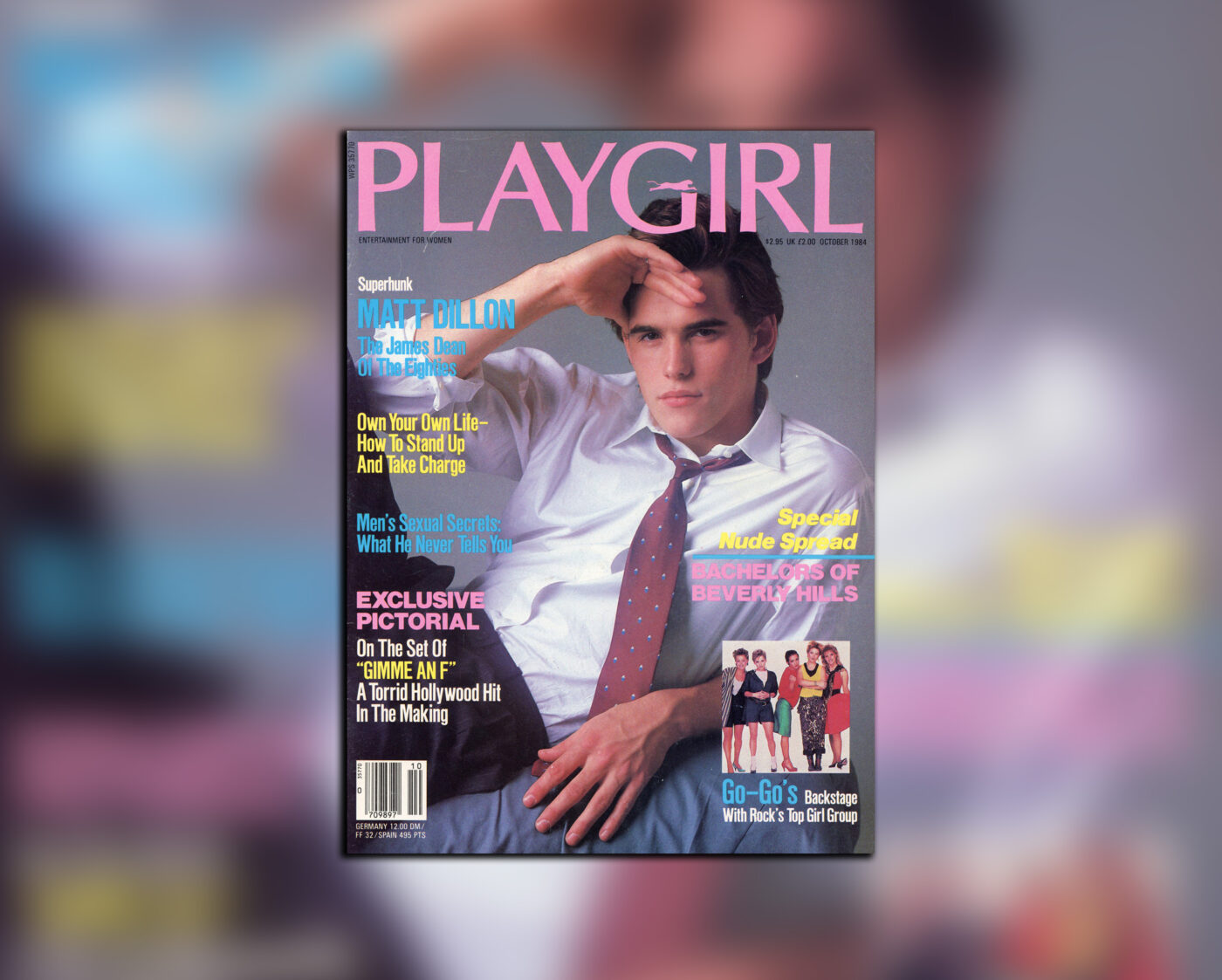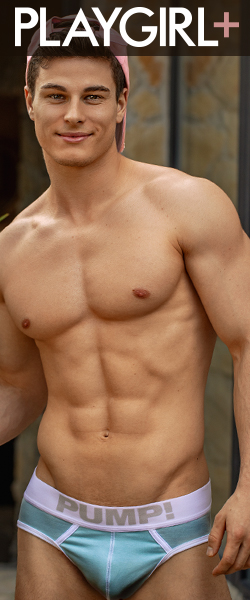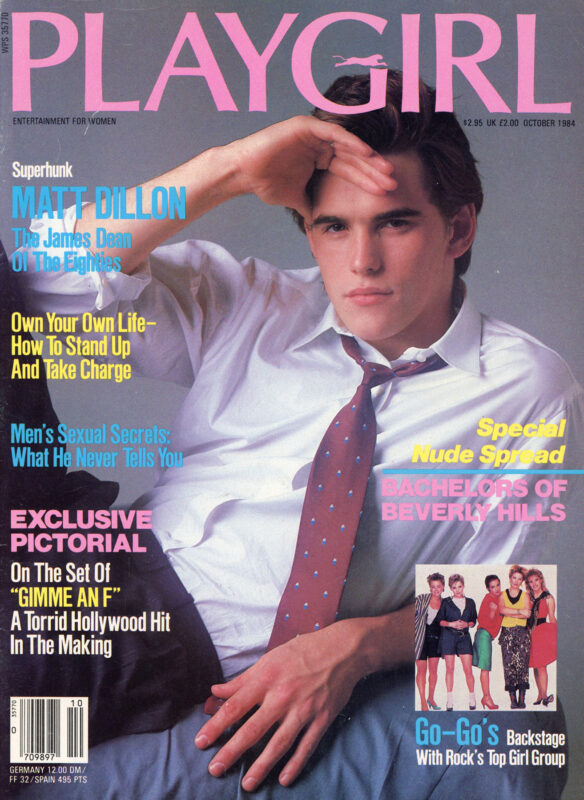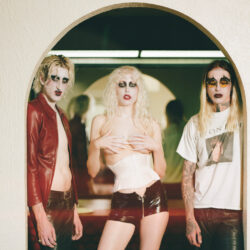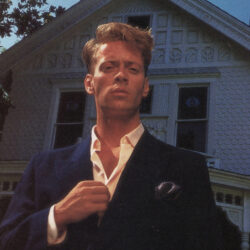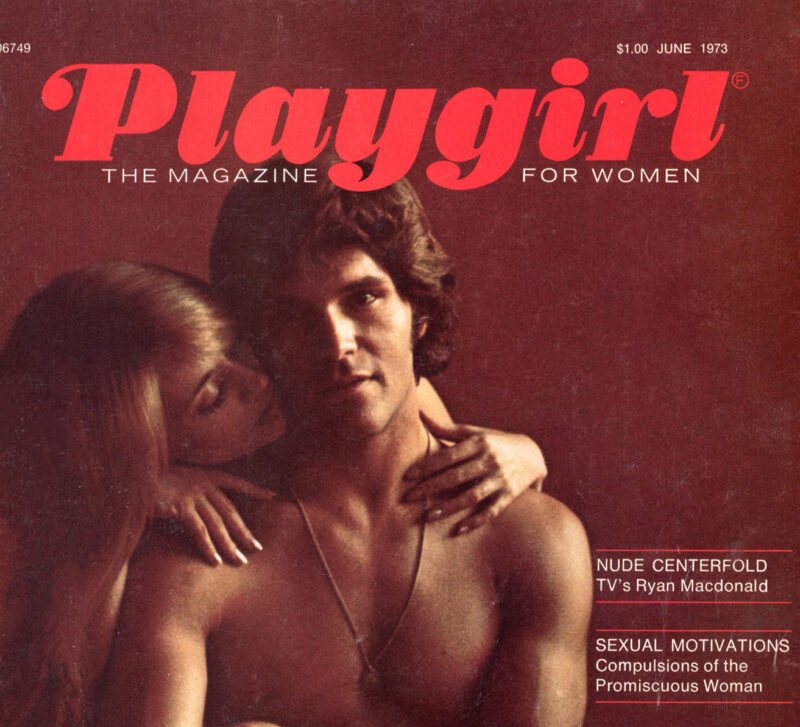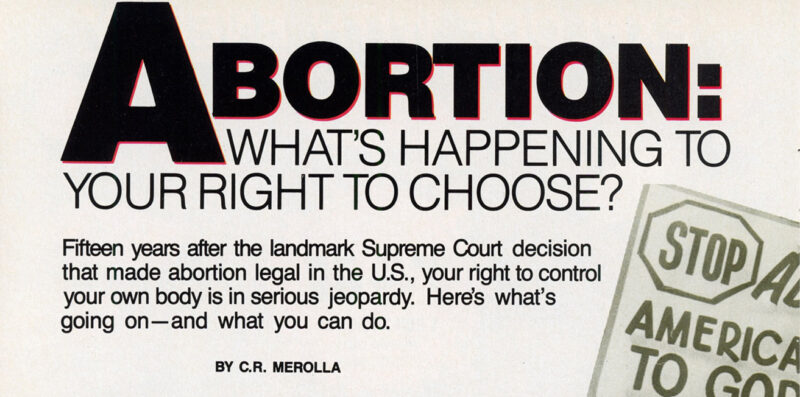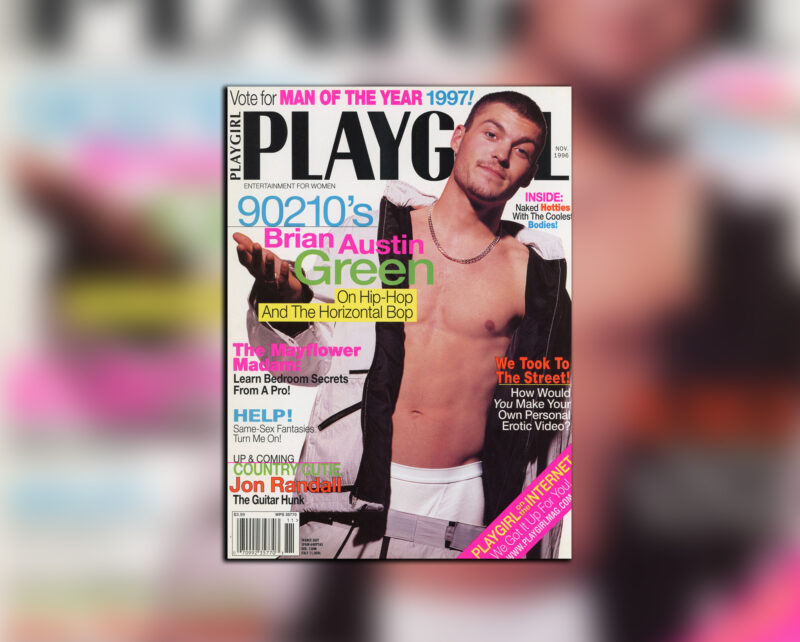MATT DILLON’S FANS ARE IN FOR a big surprise. In his upcoming movie, a comedy called The Hot Shot, he plays the college-bound son of a Brooklyn plumber who gets a job parking cars at a flashy gambling club during the summer of 1963. Wearing a crew cut and displaying unpolished manners, the character of Jeffrey looks distinctly uncool next to his nouveau riche new friends. The Hot Shot has already been shown at several sneak previews, drawing enthusiastic response and surprised appreciation for Dillon’s range.
Matt Dillon playing for laughs? This arrestingly handsome young man as a socially awkward misfit? But wait, the eye-openers don’t end there. Dillon recently set off for Australia to co-star in a romantic drama with Bryan Brown of The Thorn Birds fame. And after that film wraps up, he’ll fly to Rome to appear in an early eighteenth-century drama opposite Oscar winner Ben Kingsley.
Clearly, there’s a lot more to Matt Dillon than the public has seen so far—dimensions of feeling that go beyond the brooding rebel image that made him a star in the first place and gave him an edge over all his competitors. “Matt Dillon is the number one actor in his age group today,” claims a mid-twenties actor who has himself starred in several recent, very successful films.
Part of Dillon’s stature has to do with the fact that he simply got there first. Dillon began his career six years ago at 14, with Over the Edge, and he has been working steadily ever since. The other element in his success formula is talent. In his first movie, as well as in the subsequent Little Darlings, My Bodyguard, Tex, The Outsiders and Rumblefish, he turned in sensitive portraits of confused teenagers who confront their own limited abilities to deal with an indifferent world. Dillon wore his emotions openly and unselfconsciously, conveying both intelligence and vulnerability. Much like James Dean during the 1950s, Matt Dillon has become an emblem for his generation.
But as revealing as his performances have been, Dillon tends to be reticent—if not downright reclusive—in talking about himself. He gives few interviews and has never encouraged the “teen idol” publicity that seized upon him several years ago and still occasionally splashes his face on fan magazine covers.
In person Dillon seems relaxed and friendly, but a bit shy. From time to time, his deep voice trails off into a whisper at the end of his sentences. He seems somewhat taken aback by his fame—as if it’s the incidental reward for work well done—and anxious to correct impressions of himself that have taken hold in the public mind.
Yet the actor speaks candidly about his confused past, the current challenges of being a celebrity, and his struggle to maintain a calm, normal life.
PLAYGIRL: What is your family background, Matt? How were you raised?
DILLON: I was one of six children in a very bourgeois family. I would say that I had a healthy adolescence. I wasn’t spoiled, but I wasn’t ignored by my parents, either. I’d like to think that I had an almost perfect childhood.
I grew up in Westchester, just outside New York City; my parents still live there. There’s a beach 10 minutes away from my house, and I love to run over there when I can and jump in the water, even if it’s freezing, which it very often is.
When you were going to school, did you have any idea that you would become an actor?
To be honest with you, I wasn’t sure what I wanted to do—at least until I started acting, and then it became a real passion for me. What happened is that when I was in junior high school, Vic Ramos, who is now my manager, was casting new faces for the film Over the Edge. Vic asked me and a group of my friends from school to do a film test. I was finally chosen. Funny thing is that right after that screen test, I just knew inside of me that they were going to select me, and they did. That’s how it all started. I was only 14 then. I shot the film, and then Vic took me under his protective wing, and I have been acting ever since.
How much of your own personality was in that first character you played in Over the Edge?
A lot. Richie was a wild and rebellious young man who had seen a lot for his age and who belonged to a small town that had the highest crime in the United States. He was one of those kids who are rich, go to school, but in reality have nothing to do, so they start to take drugs and end up being criminals. In a certain way, intuitively, I knew that kind of character.
When I was in school, I kept pretending to be somebody I wasn’t, taking on different roles. I wanted the other guys to believe that I was a tough guy, hard, and they believed it. I even believed it! So, you see, I had been acting all my life, although not professionally, and I didn’t even know it! I didn’t study acting until after my third film.
Why did you want to play the role of the tough guy when you weren’t that way yourself?
Just to be somebody. And also to be above all the others. I couldn’t stand to be teased by the older guys at school, and I thought that this way I could gain their respect. And it worked! Even the older guys used to leave me alone because they thought I was so tough. Obviously, there were times when I would get myself in trouble and end up in fist fights with somebody, but never anything serious. A few Band-Aids and I was ready to start again. I knew it wasn’t me, that I was only acting.
Did you act tough with your family and your closest friends as well?
No, not with them. It was a way to put on a show, to protect myself, that’s why I was doing it. It was like a cloud that I would surround myself with so that nobody could jump on me.
But, you know, I was doing it so convincingly that I believed in it. So, in a way, it’s true that I was both acting and not acting at the same time.
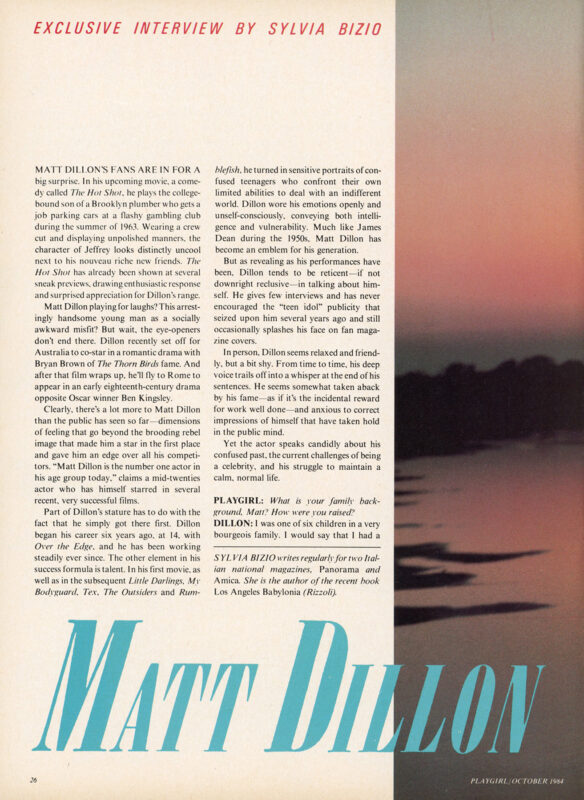
What’s your attitude toward drugs?
I tried marijuana for a while, but I gave it up. I don’t think that marijuana is particularly dangerous, but in my view there is nothing positive about something that can damage your body. At the end, drugs bring you down. I have friends who ended up in jail because of drugs, and what good can that do?
You’re one of the most popular young actors in America. Have success, money and fame changed you?
I am happy, and I’m very lucky to be in the position I’m in. But happiness comes from within, from inside your heart; no economic success can give it to you. I look at the things that I have obtained, the things I have managed to do, without, I hope, any inflated pride. I have no intention of kidding myself. If I do good work, I am the first to tell that to myself. If it is no good, I won’t lie to myself. I try to see things in a realistic way, holding my feet on the ground.
That’s why I preferred to live at home with my family—because with them I feel real.
Quite a different person from the image you portray in your films—you know, the rebellious youth, and so on.
That’s not all there is in those films! I don’t like to think of myself as a part of today’s rebellious youth. And when I make a film, I am not sitting there wondering what kind of social message that film has. The only thing that matters to me is to do good work. Of course, I don’t mind making the money, but it’s not the most important thing. You can have all the money in the world, but if you are not happy with what you do, if you are not satisfied, it’s not worth it…
… continue reading on PLAYGIRL+

